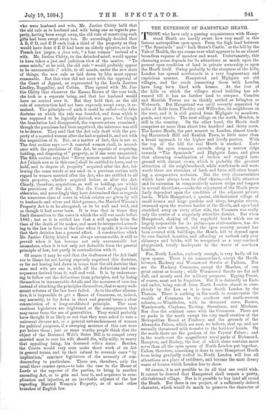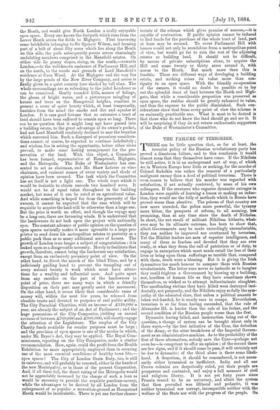THE EXTENSION OF HAMPSTEAD HEATH.
THOSE who have only a passing acquaintance with Hamp- stead Heath are hardly aware how very small is this famous metropolitan open space. From the high land between
" The Spaniards " and " Jack Straw's Castle," or the hill by the Vale of Health, the eye roams over what appears to be an almost boundless expanse of meadow and wood. Unfortunately, this charming scene depends for its attractions as much upon the present open condition of land in private ownership as upon the Heath itself. Owing probably to the steepness of the hills, London has spread northwards in a very fragmentary and capricious manner. Hampstead and Highgate are old villages, and the roads connecting them with London have long been lined with houses. At the foot of the hills on which the villages stand building has ad- vanced till it has no further land to conquer. Camden and Kentish Towns are as thickly settled as Islington or Walworth. But Hampstead was until recently separated by miles of fields from Finchley and Willesden, its neighbours on the west, and it is still parted from Highgate by meadows, ponds, and woods. The next village on the north, Hendon, is still in the country. On the other hand, the Heath itself comprises no more than about two hundred and thirty acres. The Lower Heath, the part nearest to London, almost touch- ing Haverstock Hill and Kentish Town, is little more than a broad approach to the higher and lovely portion. With the top of the hill the real Heath is reached. East- wards, the open common extends along a narrow ridge towards "The Spaniards" and Highgate Lane, and gives that charming combination of broken and rugged fore- ground with distant views, which is probably the greatest attraction of the neighbourhood, while northwards and west- wards there are stretches of bush and furze still often boast- ing a comparative seclusion. But the very characteristics which have always been its chief charm,—its hilly situation and its extension in comparatively narrow strips and tongues in several directions,—make the enjoyment of the Heath pecu- liarly dependent upon the condition of the adjacent private lands. While Hampstead, a quaint, old-fashioned village of small houses and large gardens and steep, irregular streets, swarmed upon the western border of the Heath, and open land.
stretched away on every other side, the Common was really only the centre of a singularly attractive district. But when Hampstead, shaking off the copyhold bonds which are so largely responsible for its picturesque stationariness, has de- veloped rows of houses, and the open country around has been covered with buildings, the Heath, left to depend upon its own limited beauties, and affording an outlook only over chimneys and bricks, will be recognised as a very confined playground, totally inadequate to the -wants of northern London.
For, North London, curiously enough, is very badly off for open spaces. There is no common-land, except the Heath, between Hackney and Wormwood Scrubs at Fulham. Nor are the Hackney Commons, except the Marshes, of any great extent or beauty ; while Wormwood Scrubs are flat and dull, and mostly used for military purposes. Epping Forest, of course, must not be forgotten. But it is distinctly an East- end outlet, being cut-off from North London almost as com- pletely by the Lea as it is from South London by the Thames. There is nothing in the north to counterpoise the wealth of Commons in the southern and south-western suburbs,— Wimbledon, with its thousand acres, Barnes, Wandsworth, Clapham, Tooting, Streatham, and Mitcham. Nor does the contrast cease with the Commons. There are no parks in the north except the very small creation of the Metropolitan Board at Finsbury, and the grounds of the Alexandra Palace, which are now, we believe, shut up, and are
annually threatened with transfer to the builders' bands. On the south there are the gardens of the Crystal Palace ; and in the south-west the magnificent royal parks of Richmond, Hampton, and Bushey, the first of which alone contains more acres than all the open spaces of North London put together. Unless, therefore, something is done to save Hampstead Heath from being gradually walled in, North London will lose all attractions as a place of residence, and become the most dreary waste of houses which London has to show.
Of course, it is not possible to do all that one could wish. It cannot be decreed that Hampstead shall remain a pretty.
old-fashioned village. Nor is it possible to buy land all round the Heath. But there is one project, of a sufficiently defined character, which would do much to preserve the character of
the Heath, and would give North London a really enjoyable open space. Every one knows the footpath which runs from the Lower Heath across the fields to Highgate. First traversing some brickfields belonging to Sir Spencer Wilson, and forming part of a belt of about fifty acres which lies along the Heath on this side, the path subsequently passes across charmingly undulating meadows comprised in the Mansfield estates. On either side lie grassy slopes, rising, on the south,—towards London,—to the well-known eminence of Parliament Hill, and on the north, to the woods and grounds of Lord Mansfield's residence at Caen Wood. At the Highgate end the way lies by the large ponds of the New River Company, and access is finally given to a quiet country lane shaded by tall elms. The whole surroundings are as refreshing to the jaded Londoner as can be conceived. Gently rounded hills, masses of foliage, the gleam of bright water, and a picturesque mingling of houses and trees on the Hampstead heights, combine to present a scene of quiet beauty which, at least temporarily, banishes from the mind the smoke and dirt and squalor of London. It is rare good fortune that so extensive a tract of land should have been suffered to remain open so long. There can be no question that it might long ago have passed into a building estate, to the great advantage of its owner's pocket, bad not Lord Mansfield resolutely declined to mar the beauties which surround him. Such a disregard of pecuniary considera- tions cannot, of course, be expected to continue indefinitely ; and wisdom lies in seizing the opportunity, before other views prevail, to make some lasting arrangement for the pre- servation of the land. With this object, a Committee has been formed, representative of Hampstead, Highgate, and the Metropolis. The Duke of Westminster has con- sented to act as chairman, and Mr. Shaw Lefevre as vice- chairman, and eminent names of every variety and shade of opinion have been secured. The task which the Committee has set itself is not a light one. The whole tract which it would be desirable to obtain exceeds two hundred acres. It would not be of equal value throughout in the building market, but none of it can be rated at an agricultural value. And while something is hoped for from the generosity of the owners, it cannot be expected that the sum which will be requisite to acquire the land will be otherwise than a large one. But the prize is worth an effort, and though the voyage may be a long one, there are favouring winds. It is understood that the landowners do not look upon the project with unfriendly eyes. The constant advance of public opinion on the question of open spaces naturally makes it more agreeable to a large pro- prietor to send down his metropolitan estates to posterity as a public park than as so many additional acres of houses. The growth of London is no longer a subject of congratulation ; it is looked upon as a disagreeable necessity. Merely to facilitate that growth, therefore, cannot bring the landowner any satisfaction, except from an exclusively pecuniary point of view. On the other hand, to direct the march of the blind Titan, and by a judiciously guiding hand to prevent the trampling out of every natural beauty is work which must have attrac- tions for a wealthy and influential man. And quite apart from any sacrifice on the part of the landowners in point of price, there are many ways in which a friendly disposition on their part may greatly assist the movement. On the other hand, it seems likely that considerable sums of money will, within the next few years, be released from obsolete trusts and devoted to purposes of real public utility. The City Parochial Charities, with an income of £120,000 a year, are already the subject of an Act of Parliament ; and the huge possessions of the City Companies, yielding an annual revenue of between £700,000 and £800,000, will shortly engage the attention of the Legislature. The surplus of the City Charity funds available for secular purposes must be large ; and the provision of open spaces is one of the modes in which, under Mr. Bryce's Act, they may be applied. The Royal Com- missioners, reporting on the City Companies, make a similar recommendation. How, again, could the profit from the Health Exhibition be more appropriately employed than in securing one of the most essential conditions of healthy town life,— open spaces ? The City of London Grain Duty, too, is still in existence, and will probably be renewed, either in the hands of the new Municipality, or in those of the present Corporation. And, if all these fail, the direct rating of the Metropolis would not be appreciably increased by the charge of such a loan as would be necessary to provide the requisite purchase-money, while the advantages to be derived by all London from the enlargement of so popular a recreation-ground as Hampstead Heath would be incalculable. There is yet one further charac- teristic of the scheme which gives promise of success,—it is capable of contraction. If public opinion cannot be induced to find funds for the purchase of the whole tract of land, part at least may be secured. To cover Parliament Hill with houses would not only be scandalous from a metropolitan point of view, but would gO far to ruin the rest of the adjoining estates as building land. It should not be difficult, by means of private subscriptions alone, to acquire the Hill and some twenty or thirty acres around it, with access to the Heath. But much more than this is feasible. There are different ways of developing a building estate, and nothing raises its value more than con- tiguity to an open space. With the friendly co-operation of the owners, it would no doubt be possible so to lay out the splendid tract of land between the Heath and High- gate, that while a considerable proportion was preserved as open space, the residue should be greatly enhanced in value, and thus the expense to the public diminished. Such con- siderations show that from every point of view the scheme is an eminently practicable one. What is most to be desired is that those who do not know the land should go and see it. It will be surprising if they do not return enthusiastic supporters of the Duke of Westminster's Committee.



































 Previous page
Previous page